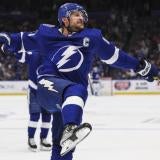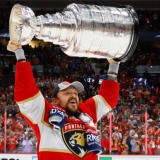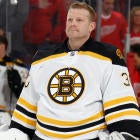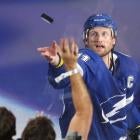Since stepping away from hockey for good in 2014, Tim Thomas has largely stayed out of the public eye. The former Bruins goaltender has rarely made appearances or done interviews since retiring and many assumed that was strictly due to his desire for privacy.
But Thomas re-emerged this week as he was inducted into the U.S. Hockey Hall of Fame and provided some heartbreaking insight into why he disappeared for so many years. An emotional Thomas spoke to the media ahead of his induction on Thursday night and revealed that he has been struggling with the effects of brain damage he believes came as the result of a concussion suffered during his playing career.
Thomas, 45, says that a head injury he suffered in 2013 (then with the Florida Panthers) changed his life and created a multitude of health problems.
"I woke up the next morning after it, and I couldn't decide what I wanted to eat, where I wanted to go," Thomas said. "I couldn't plan a schedule. I survived by following the team schedule the rest of the year and just made it through that season."
After making it through the season, Thomas decided to step away from the game for good, but the problems persisted.
According to the Associated Press, doctors told Thomas that two-thirds of his brain were getting less than five-percent blood flow, while the other third was averaging about 50-percent.
"I couldn't keep up with watching a game for a few years after I stopped playing," he said. "My brain wasn't functioning well enough to watch a game. So I sat in the woods for a few years."
Former Bruins goalie Tim Thomas makes a rare public appearance ahead of US Hockey Hall of Fame.
— Emily Kaplan (@emilymkaplan) December 12, 2019
“I couldn’t keep up with watching a game for a few years after I stopped playing... My brain wasn’t functioning well enough to watch a game. So I sat in the woods for a few years.” pic.twitter.com/o43ZGCpWYY
As he struggled in private, Thomas said he shut down. He rarely communicated with others, even those closest to him, as he failed to wrap his head around what was happening to his health. He also watched very little hockey, saying it was difficult for his brain to keep up with the speed of the game.
But after years of therapy, and communication and experimental treatments, Thomas said he's doing better. On Wednesday night, he attended his first NHL game since retiring, dropping the ceremonial first puck before the Bruins took on the Capitals in Washington.
"I'm so much better," Thomas said. "But I wake up every day and basically I have to reorder everything in my mind for the first couple hours of the day and then make a list and try to make some choices to get some stuff done."
Even though he's improving, he's still somewhat apprehensive about stepping back into the spotlight and opening up.
"I didn't want to talk about this," Thomas said. "I didn't want to talk. I didn't want to tell the world this stuff. Not till I felt ready, and I didn't feel ready yet. But here I am."
After years of struggling to break into the NHL, Thomas finally made his debut with the Bruins as a 28-year-old in 2002. He went on to have a successful eight-year run in Boston, twice winning the Vezina Trophy as the league's best goaltender. He also led the Bruins to a Stanley Cup title in 2011 and won the Conn Smythe as MVP of the playoffs at the conclusion of that run.
He chose to take a year off to focus on "friends, family and faith" following the 2011-2012 campaign before returning to the NHL and splitting his final season between the Panthers and Stars.


















